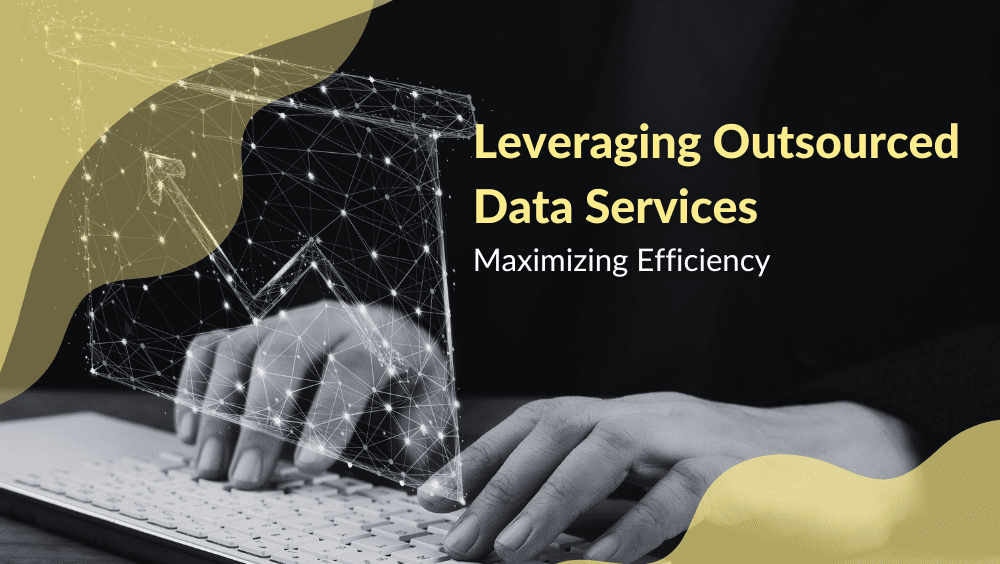In this age of digital transformation, data has become the bedrock of decision-making for businesses across all industries. From e-commerce giants to healthcare providers, data fuels operations, guides strategies, and shapes customer experiences.
However, it’s not really easy to harness the potential of data given the volume, velocity, and variety. With this, many companies are turning to data service outsourcing as a strategic solution to efficiently manage and leverage their data assets.
Is your company looking to benefit from one? Keep reading!
First things first: Understanding Data Service Outsourcing

Data service outsourcing involves delegating data-related tasks to external service providers, thereby freeing up internal resources and leveraging specialized expertise. This outsourcing model encompasses a wide range of services tailored to meet the diverse needs of businesses:
1. Data Entry
Data entry forms the foundation of data processing. It involves the input of raw information into digital systems. It includes tasks such as transcribing handwritten documents, converting paper records into electronic formats, and inputting data from various sources into databases or spreadsheets. While seemingly straightforward, data entry demands precision and attention to detail to ensure accuracy and reliability.
A person handling data entry work should be very thorough with his or her work even with the aid of data entry tools!
2. Data Annotation
Data annotation is the process of labeling or tagging data with metadata. This allows the machines to understand and interpret it effectively. In fields like machine learning and artificial intelligence, annotated data sets are indispensable for training algorithms to recognize patterns, make predictions, and automate tasks. Some of the common annotation tasks include image labeling, text categorization, and semantic segmentation. Each task requires domain-specific knowledge and meticulous annotation methodologies.
3. Data Extraction
From the name itself, data extraction involves retrieving specific information from unstructured or semi-structured data sources. These sources may be text documents, websites, or multimedia files. Whether extracting customer feedback from online reviews or aggregating financial data from disparate sources, this process streamlines data collection and facilitates analysis.
Some companies also utilize advanced techniques like natural language processing (NLP) and optical character recognition (OCR). These would enhance extraction accuracy and efficiency, enabling organizations to unlock valuable insights hidden within vast data repositories.
4. Data Processing
Lastly, data processing encompasses a spectrum of activities aimed at transforming raw data into actionable insights. This includes cleaning and deduplicating data to ensure consistency and integrity, analyzing data to identify trends and patterns, and visualizing data to communicate findings effectively.
It’s safe to say that the proliferation of big data technologies and analytics platforms allows organizations to leverage data processing outsourcing to streamline operations, optimize resource allocation, and drive informed decision-making.
There are numerous benefits of Data Service Outsourcing
Organizations seeking to maximize the value of their data assets will find data service outsourcing very appealing. Some of its compelling advantages include:
Cost Efficiency
There is great demand and relevance for data-related services everywhere, no matter the industry. This is why the costs of hiring an in-house team are typically expensive. Outsourcing data-related tasks eliminates the need for extensive investments in infrastructure, technology, and manpower. Companies may just leverage the resources of specialized service providers. This will allow them to significantly reduce operational costs while maintaining high-quality standards. Moreover, outsourcing allows businesses to scale operations dynamically, adjusting resource allocation according to fluctuating demand and evolving priorities.
Efficiency in Work
By delegating data-related functions to external experts, organizations can redirect internal resources toward core business activities and strategic initiatives. This enables companies to concentrate their efforts on innovation, product development, and customer engagement, fostering competitiveness and market differentiation. With data service outsourcing handling routine tasks, employees can focus on value-added activities that drive growth and profitability.
Access to Specialized Expertise
Data service providers possess specialized skills, technologies, and domain knowledge that may not be readily available within the organization. Or if it is, there may be limitations due to less exposure. Whether it’s expertise in data annotation for computer vision applications or proficiency in data mining techniques for market research, outsourcing partners bring a wealth of experience to the table. This access to specialized expertise accelerates project timelines, enhances output quality, and facilitates innovation across diverse industries and use cases.
Scalability and Flexibility
The best thing about data service outsourcing is that it offers unparalleled scalability and flexibility. Organizations can adapt rapidly to changing business requirements and market dynamics. Whether scaling up operations to accommodate growth or pivoting strategies in response to emerging trends, outsourcing partners can seamlessly adjust resource allocation and service delivery models. This agility empowers businesses to remain agile and resilient in the face of uncertainty! At the end of the day, they would be able to drive continuous improvement and sustainable success.
Key Considerations for Outsourcing Data Services

While data service outsourcing presents compelling benefits, organizations must navigate certain considerations to maximize its effectiveness:
Data Security and Confidentiality
Protecting sensitive data and ensuring compliance with regulatory requirements are paramount considerations when outsourcing data services. Organizations must carefully vet potential service providers, assess their data security protocols, and establish robust contractual agreements to safeguard confidentiality and mitigate risks. Implementing encryption, access controls, and data anonymization techniques can further enhance security measures and instill trust in outsourcing partnerships.
Quality Assurance
Maintaining high standards of accuracy and reliability is critical when outsourcing data-related tasks. Companies need to establish clear quality assurance processes, conduct regular audits, and provide feedback mechanisms. These are all but essential for monitoring performance and ensuring compliance with predefined quality metrics. Additionally, leveraging automation tools and machine learning algorithms can enhance efficiency and consistency while minimizing errors and discrepancies.
Communication and Collaboration
Effective communication and collaboration are essential in any task, but more so for successful outsourcing engagements. The data work is in the hands of experts, but it never hurts to establish open channels of communication. Make sure to regularly set clear expectations, and foster a collaborative mindset.
Usually, the company and the data service partner would conduct regular meetings, progress updates, and performance reviews. These are necessary to ensure transparency and accountability, and so that both parties can proactively address issues and drive continuous improvement.
Time Zone Differences
Navigating cultural nuances and time zone differences can pose challenges in global outsourcing arrangements. Organizations must invest in cross-cultural training, promote cultural sensitivity, and foster a culture of inclusivity and respect. Additionally, leveraging technology-enabled collaboration tools and implementing flexible work schedules can bridge time zone gaps and facilitate seamless coordination across distributed teams.
Organizations must leverage every available resource to harness the full potential of their data assets. Data service outsourcing offers a strategic approach to efficiently manage data-related tasks, unlock insights, and drive innovation.
KamelBPO is a trusted outsourcing partner with a track record of security, quality, and communication when it comes to data service. The company engages with organizations from various industries to embrace digital transformation. With the goal of helping businesses streamline operations, enhance agility, and focus on core competencies, you can surely count on our team! Access a wealth of expertise and resources, and make sure you are making the most out of your valuable data with KamelBPO!
Send us a message to learn more.

